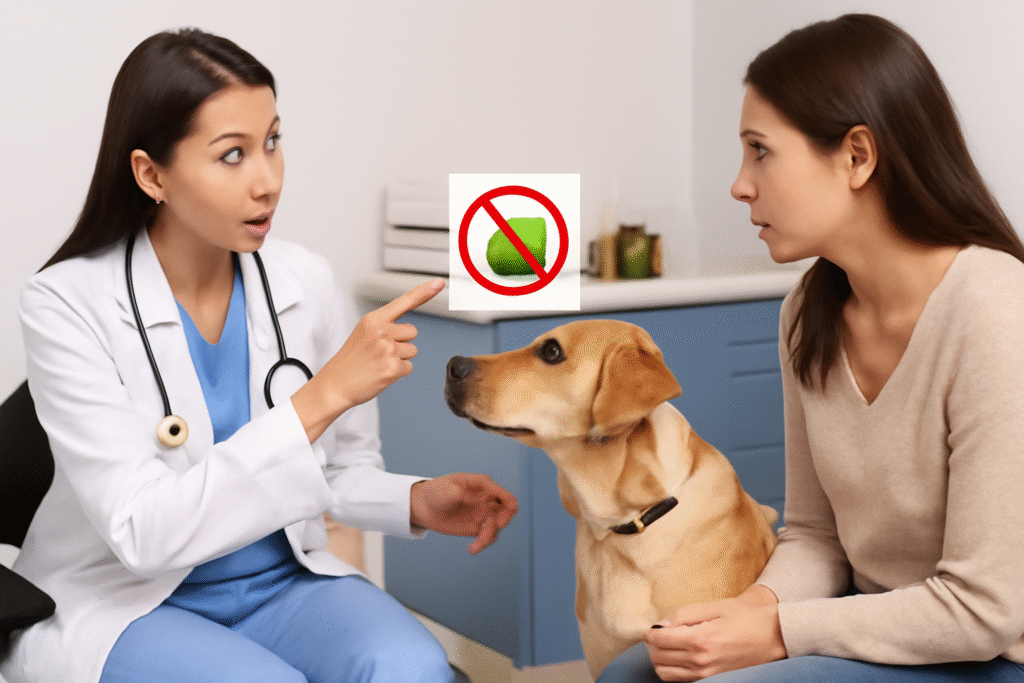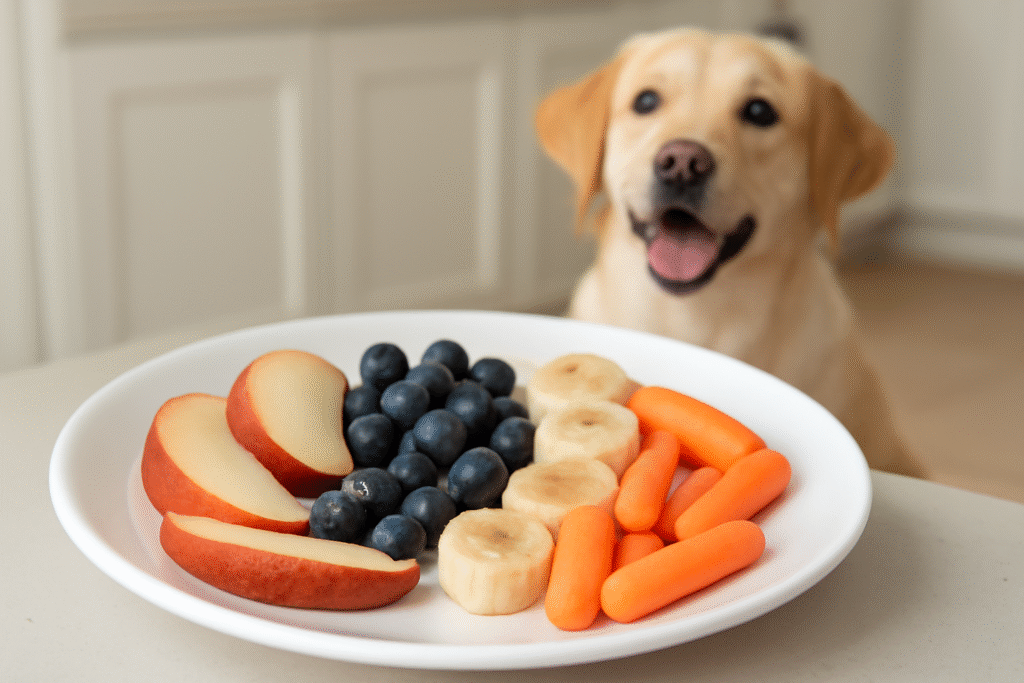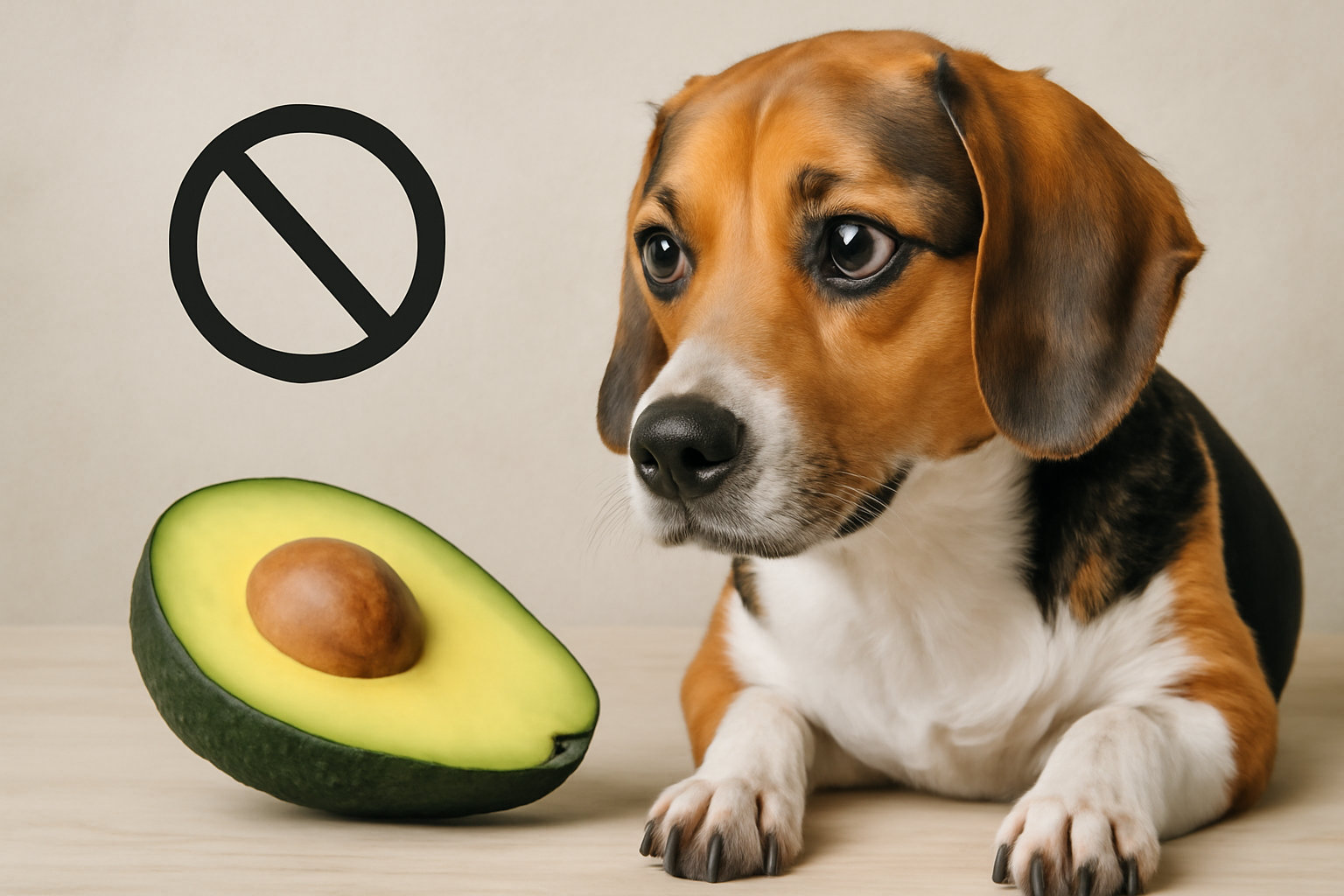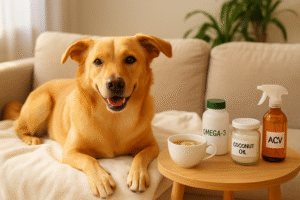Medical Disclaimer: This article is for informational purposes only and does not substitute for professional veterinary advice. Always consult your veterinarian about your pet’s specific dietary needs or if ingestion of a questionable food has occurred.
Table of Contents
Introduction
It’s creamy, packed with nutrients, and probably sitting on your kitchen counter—but can dogs eat avocado safely? You’re not alone in asking. As a veterinarian, I’ve seen avocado spark more confusion than almost any other human food.
Some pet owners have heard it’s toxic. Others point to dog food labels featuring avocado oil. So what’s the real story? Is it a dangerous indulgence or a misunderstood superfood?
In this article, I’ll unpack the science, risks, and vet-approved exceptions behind feeding avocado to dogs—so you can make smart, safe decisions without relying on guesswork or myths.
🟢 Key Takeaways
- Can dogs eat avocado? While the flesh has fewer toxins, feeding raw avocado to dogs is generally not recommended due to the risks of persin toxicity, high fat content, and choking or obstruction from the pit.
- Persin, a natural fungicide in avocados, is highly toxic to birds and large animals, and though dogs are more resistant, large amounts can still cause vomiting, diarrhea, or even heart damage.
- Pancreatitis, a painful and potentially serious condition, is a major concern due to avocado’s high fat levels.
- The pit poses choking and blockage risks—even if no symptoms appear right away.
- Processed avocado ingredients (like avocado oil or meal) used in commercial dog foods are safe because they’re purified and incorporated at safe levels.
- Always consult a vet or contact Pet Poison Helpline if your dog eats any part of an avocado.
What Is Persin and Why Does It Matter?
Where Persin Is Found in the Avocado Plant
To truly answer can dogs eat avocado, we need to understand persin. This fungicidal toxin is found in every part of the avocado plant—most heavily concentrated in:
- Leaves
- Bark
- Skin
- Pit
The flesh contains significantly less persin, but it’s not toxin-free. According to the Pet Poison Helpline, unripe fruit has higher persin levels than ripe fruit. This means that a dog helping themselves to an underripe avocado could face a higher toxic load.

How Dogs React to Persin Compared to Other Animals
Persin can be deadly to birds, cattle, horses, and goats—but dogs are more resistant. That said, “more resistant” doesn’t mean “immune.” Ingesting large quantities of avocado flesh can still lead to:
- Vomiting
- Diarrhea
- Abdominal pain
- In rare cases, myocardial damage
While can dogs eat avocado is often debated, most veterinary toxicologists agree there’s no known safe threshold for persin in dogs. This uncertainty, echoed by the VCA Animal Hospitals, underlines the precautionary advice: avoid it unless it’s in a vet-approved commercial formula.
Why Avocado Isn’t Dog-Friendly (Except in Some Foods)
A Vet’s Perspective: Why I Don’t Recommend Raw Avocado
When pet owners ask me, “can dogs eat avocado?”, my go-to answer is: not unless it’s processed into commercial dog food. In my clinical experience, even small amounts of raw avocado can trigger vomiting or diarrhea, especially in dogs with sensitive stomachs or a history of pancreatitis.
I once treated a senior Miniature Schnauzer who developed acute pancreatitis after sneaking half an avocado off the counter. It wasn’t the persin that caused trouble—it was the fat. He recovered after IV fluids and hospitalization, but it highlighted how risky this fruit can be, even in moderation.
This aligns with the caution urged by the ASPCA Animal Poison Control Center, which lists avocado as toxic to many animals, and still cautions dog owners to avoid it.
The Three Main Risks: Persin, Fat, and the Pit
The question can dogs eat avocado hinges on three overlapping threats:
- Chemical hazard – Persin, a naturally occurring toxin, varies in concentration by part of the fruit and can cause GI upset or rare heart issues in dogs.
- Nutritional hazard – The high-fat content can trigger pancreatitis, especially in predisposed breeds.
- Physical hazard – The pit is a choking and intestinal obstruction risk, especially in small or medium-sized dogs.
These risks stack—not replace—each other. Even if your dog avoids the pit, the fat or persin alone can cause problems. That’s why the consistent veterinary guidance is to avoid feeding raw avocado altogether (Merck Veterinary Manual). Dog can eat mangoes and you can read more about it in given link
Fat Overload: Why Avocado Can Upset Your Dog’s Tummy
Pancreatitis Risk in Dogs
Even if persin levels are low, the fat content alone is reason enough to avoid raw avocado. Avocados are rich in monounsaturated fats, which are healthy for humans—but not always for dogs. In clinical practice, I’ve seen dogs, especially those predisposed to pancreatitis, develop vomiting and abdominal pain after consuming fatty foods like avocado.
Pancreatitis is an inflammation of the pancreas that can be life-threatening. Common symptoms include:
- Repeated vomiting
- Abdominal pain (often seen as the “prayer position”)
- Loss of appetite
- Lethargy
According to Tufts University’s Cummings School of Veterinary Medicine, high-fat treats are a common trigger for this painful condition.

Which Dogs Are Most at Risk from Fatty Foods
If you’re wondering can dogs eat avocado safely, consider your dog’s breed and medical history:
- Miniature Schnauzers, Yorkies, and Shelties are especially prone to pancreatitis.
- Dogs with a history of GI issues or previous episodes of pancreatitis should never be offered avocado.
- Overweight or sedentary dogs are also more vulnerable to fat-related health issues.
The risk of feeding fatty human food is cumulative—and irreversible in some cases. In those dogs, even a tablespoon of avocado could tip the scales toward a medical emergency.
Pitfall Dangers: Why the Avocado Pit Can Be Deadly
Choking and Obstruction Risks
Among the many reasons why the answer to can dogs eat avocado is usually no, the pit stands out as one of the most urgent. Roughly the size of a ping-pong ball, the avocado pit poses an immediate choking hazard, particularly for small and medium-sized dogs.
But the danger doesn’t stop if your dog manages to swallow it. The pit is indigestible and can lodge anywhere in the digestive tract—esophagus, stomach, or intestines—causing a foreign body obstruction. Surgical removal is often the only solution.
In my own clinic, I’ve had to refer dogs for emergency endoscopy after they ingested fruit pits, including avocados. Recovery is possible, but it’s costly, stressful, and dangerous.
Emergency Symptoms to Watch For
If your dog may have swallowed a pit, watch for:
- Gagging or choking
- Pawing at the mouth
- Repeated vomiting
- Swollen or painful abdomen
- Complete refusal to eat
These are red flags for a GI obstruction. According to the Canadian Veterinary Medical Association (CVMA), obstruction symptoms may take hours or even a full day to appear—so don’t assume your dog is safe just because they’re initially acting normal.
Symptom Guide: How to Know If Avocado Made Your Dog Sick
Mild Signs of Trouble
After eating avocado, a dog may show subtle signs before progressing to more severe symptoms. The most common reactions involve gastrointestinal upset due to fat content or persin.
Look for:
- Vomiting – Even small amounts of avocado flesh can trigger this.
- Diarrhea – Often occurs alongside vomiting, especially in dogs with sensitive stomachs.
- Abdominal discomfort – Your dog may pace, whimper, or lie curled up.
- Decreased appetite – A general indicator of nausea or pain.

Red Flag Symptoms Needing Immediate Vet Care
These symptoms might resolve on their own, but if they persist longer than 24 hours, you should call your veterinarian.
If you’re still wondering can dogs eat avocado safely, the answer becomes very clear when symptoms escalate.
Seek emergency help if your dog shows:
- Lethargy or collapse
- “Prayer position” – A tell-tale sign of pancreatitis, where the front end lowers while the back stays elevated
- Persistent vomiting (more than 3 times)
- Severe abdominal swelling
- Difficulty breathing – May signal choking, swelling from toxicity, or heart involvement
- Cyanosis (blue gums/tongue) – Suggests heart or lung involvement
- Gagging or pawing at the mouth – Possible pit obstruction
This matches symptom profiles outlined by the Merck Veterinary Manual and ASPCA.
Timely intervention can be life-saving—especially if a large amount of avocado or the pit has been consumed.
What to Do If Your Dog Eats Avocado
When to Watch and Wait
If your dog ate a small amount of ripe avocado flesh, the risk is generally low—but not zero. In my clinic, I often advise owners to monitor their dog for 24 hours while keeping a close eye on appetite, energy, and bathroom habits.
What to do:
- Remove any remaining avocado immediately
- Watch for vomiting, diarrhea, or abdominal pain
- Offer bland food (like boiled chicken and rice) if your vet advises
- Ensure access to fresh water
- Call your vet if symptoms develop or persist
When in doubt, call your veterinarian or a poison control center like the Pet Poison Helpline (1-855-764-7661).
When to Call Poison Control or Rush to the Vet
If your dog ate:
- Avocado skin, pit, or leaves
- A large amount of avocado flesh
- Unripe avocado (higher persin concentration)
Then you should act immediately—even if your dog appears fine at first.
Steps:
- Call your veterinarian or the ASPCA Animal Poison Control Center at 1-888-426-4435
- Do not induce vomiting unless directed
- Watch for delayed symptoms, especially obstruction signs
- Get to emergency care if serious symptoms develop (e.g., prayer position, collapse, or choking)
Knowing the emergency numbers ahead of time helps you respond quickly when every minute counts.

Why Avocado in Dog Food Is Usually Safe
How It’s Processed Differently
Here’s where things get a little confusing. If you’ve ever read the back of a premium kibble bag and spotted “avocado oil” or “avocado meal”, you may have wondered—can dogs eat avocado after all?
The answer: only when it’s professionally processed and properly formulated. According to VCA Animal Hospitals, the small amounts of avocado derivatives used in commercial dog foods are safe because they’ve been stripped of persin and added in controlled quantities.
Nutritional Benefits Without the Risks
Processed avocado ingredients in dog food—like avocado meal (dehydrated flesh) or avocado oil—provide valuable nutrients, such as:
- Omega fatty acids (for skin and coat health)
- Vitamins A, B6, C, and E
- Potassium, magnesium, and antioxidants
- Soluble fibre, which supports healthy digestion
One example is Avoderm, a brand that uses avocado oil and meal in its formulations with a long track record of safety. However, it’s critical to understand that this doesn’t mean dogs can eat avocado at home. Processed ingredients are very different from raw or homemade offerings.
This distinction is supported by the Pet Poison Helpline, which confirms that avocado in processed dog foods is safe—but raw avocado still carries risk.
Keeping Avocados Out of Paw’s Reach
Storage, Disposal, and Training Tips
Preventing exposure is far easier than dealing with an emergency. For pet parents asking can dogs eat avocado, the best answer is: they won’t if you keep it out of reach.
Here are some proactive strategies I recommend to clients:
- Store avocados on high counters or in cupboards—never within reach of curious pups.
- Dispose of pits and skins immediately in a pet-proof garbage bin or sealed compost container.
- Avoid backyard avocado trees (if you live in a region where they grow) or fence them off.
- Take scraps directly outside rather than into indoor bins where dogs might scavenge.
Educating everyone in the household—kids, roommates, and guests—is just as important. Make sure they understand that feeding dogs human food can be dangerous, even if it seems healthy.
Safe Human Food Alternatives to Avocado
If you’re tempted to share snacks with your pup, here are safer, vet-approved alternatives:
| Food | Benefits | Notes |
|---|---|---|
| Apple | Fibre, vitamins, low fat | Remove core & seeds |
| Blueberries | Antioxidants, low sugar | Serve fresh or frozen |
| Banana | Potassium, fibre | Serve in moderation |
| Carrots | Crunchy, low calorie, vitamin A | Great for teeth |
| Plain cooked pumpkin | Digestive support, low fat | Avoid sweetened or spiced varieties |
These options let you include your dog in snack time without worrying, can dogs eat avocado and face the consequences later.
Quick-Glance Tables for Reference
Table 1: Avocado Parts & Associated Risks
| Avocado Part | Primary Risks | Potential Symptoms |
|---|---|---|
| Flesh | Low persin, high fat | Vomiting, diarrhea, pancreatitis, rare heart effects |
| Skin | High persin, high fat | Vomiting, diarrhea, pancreatitis, potential toxicity |
| Pit | Choking, GI obstruction, high persin | Gagging, vomiting, intestinal blockage, emergency surgery required |
| Leaves/Plant | High persin | Severe GI upset, rare heart toxicity, potential swelling or breathing issues |
Table 2: Symptoms & What to Do
| Symptom | Severity | Recommended Action |
|---|---|---|
| Vomiting, Diarrhea | Mild to moderate | Monitor; call vet if >24h |
| Abdominal Pain | Moderate | Vet consult recommended |
| Prayer Position | Severe (pancreatitis) | Emergency vet care immediately |
| Gagging, Pawing Mouth | Severe (choking) | Emergency vet care immediately |
| Refusal to Eat | Moderate to severe | Vet consult within hours |
| Lethargy | Warning sign | Call vet; monitor closely |
| Blue Gums or Breathing Trouble | Emergency | Go to emergency clinic now |
Table 3: Safer Snack Substitutes for Dogs
| Food Item | Benefits | Serving Notes |
|---|---|---|
| Apple | Fibre, vitamin C, low fat | Remove seeds and core |
| Blueberries | Antioxidants, low sugar | Small handful is safe |
| Banana | Potassium, vitamins | Moderation due to sugar content |
| Carrots | Vitamin A, low calorie | Raw or steamed |
| Pumpkin | Digestive support, fibre | Plain, cooked only |
These tables simplify decision-making when you’re unsure and keep the key takeaways at your fingertips. Still wondering can dogs eat avocado? These visuals say: it’s just not worth the risk.
FAQs About Dogs and Avocado
Can dogs eat guacamole if it’s just avocado?
No. Guacamole often contains onions, garlic, salt, and spices—all of which are toxic to dogs. Even plain guacamole made only with avocado isn’t safe due to the fat and persin content. Better to play it safe and avoid entirely.
Is avocado oil safe for dogs?
It depends. Avocado oil used in commercial pet foods is processed to remove persin and added in safe amounts. But human-grade avocado oil can still pose a fat overload risk, especially for dogs prone to pancreatitis. Always consult your vet before using it.
What about avocado in homemade dog treats?
Homemade treats with avocado are not recommended, as there’s no way to measure persin levels or ensure processing reduces toxicity accurately. While it might seem nutritious, there are safer alternatives.

Why do some dog foods contain avocado if it’s toxic?
Great question. Processed avocado meal or oil in dog food is specifically treated to remove dangerous compounds. These formulations have been tested for safety, unlike raw avocado at home.
How much avocado is toxic to dogs?
There’s no established safe threshold, according to the Merck Veterinary Manual. Toxicity depends on the dog’s size, health, and which part of the avocado was eaten. That uncertainty is why the general vet consensus is: don’t risk it.
Final Thoughts from a Canadian Vet
As a veterinarian, I’ve been asked countless times: can dogs eat avocado? After seeing the consequences firsthand—from mild vomiting to full-blown pancreatitis and surgical emergencies—my answer is clear: don’t feed raw avocado to dogs.
Yes, the flesh contains less persin. Yes, the nutrients seem appealing. But the risks far outweigh the benefits, especially when there are safer, vet-approved treats available. And remember, dogs don’t need avocado to be healthy—what they need is a complete, balanced diet, regular vet checkups, and a loving home that keeps danger out of reach.
When in doubt, always consult your vet. Because while avocado might be trendy for us humans, it’s a risky gamble for our four-legged companions.





Pingback: Can Dogs Eat Plums Safely? Top 6 Dangers & Expert Feeding
Pingback: How to Choose a Veterinarian: 7 Key Steps